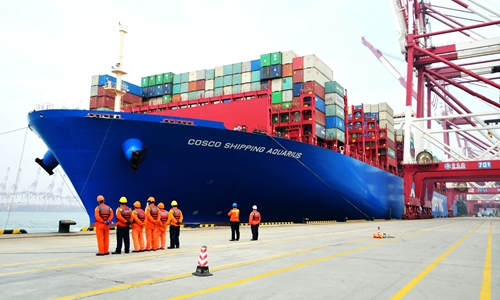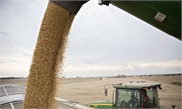COVID-19 outbreak dents US' ability to carry out phase one deal: experts
Washington may have difficulty meeting commitments: experts

A COSCO ship at Qingdao Port in East China's Shandong Province on February 11 Photo: IC
The worsening public health crisis in the US is fueling concerns over Washington's ability to hold up its side of the bargain in the China-US phase one trade agreement and sparking suggestions that the two sides might have to conduct consultations to put the lingering trade war on hold amid the coronavirus battle.
While China's economy steadily returns to normalcy, the US is facing a spreading outbreak that could damper its economic activities, which could mean it cannot supply products for export to China to meet commitments under the phase one deal, Chinese experts said on Sunday.
Trade consultations should be held to address the emerging issues to avoid bigger disputes or an escalation in tension, they noted.
"There have been some concerns about China's ability to implement the phase one deal due to the epidemic, but recent developments show that it is the US' situation that might be worrisome, in terms of implementation of the agreement," Huo Jianguo, vice chairman of the China Society for World Trade Organization Studies in Beijing, told the Global Times on Sunday, pointing to China's measures to increase purchases of US goods.
Under the phase one agreement, China is committed to increase purchases of US products, including agricultural, manufactured goods, energy and other items, by $200 billion over the next two years. China has moved to lift bans on US products such as poultry and exempted tariffs for hundreds of US goods, even as it faced the epidemic, which naturally drive down domestic demand.
Such measures boosted China's purchases of US products in the first two months of the year. During the period, China's imports of US soybeans rose 14.2 percent, pork 160 percent, coal 33.1 percent and crude oil 5.2 percent, according to data compiled by China Merchants Bank.
"There is no doubt that China is implementing the deal consistently," Gao Lingyun, a trade expert with the Chinese Academy of Social Sciences, told the the Global Times on Sunday. "But the concern is now about how much of US production activity will be affected by the epidemic and whether the US can supply enough products as China's demand resurges."
As of Sunday morning, there were more than 420 confirmed cases of coronavirus in over 30 states, according to US media reports. There is also criticism of US officials' lack of transparency in their efforts to contain the virus, and the situation might be much worse.
"Given the lack of transparency in the US, it is hard to access how the epidemic has affected production activities," Gao said, noting that officials from both sides should engage in consultations over possible impact of the epidemic on their phase one deal.
There is a force majeure clause in the agreement that address situations like the epidemic, but Chinese officials have not invoked the clause despite suggestions. However, given the situation in the US, consultations over the clause might be necessary to avoid future disputes and even escalation, experts said.
"Without proper discussions in advance, we could see the two sides blaming each other and bilateral tensions could rise again. That would be devastating on top of all of these problems," Huo said, adding that "proactive talks" are necessary to address potential disputes.
Some in the US are also calling for reconsideration of the phase one deal. US Senator Chuck Grassley suggested last week that the US should give China "some leeway" in carrying out the deal given the downturn in the Chinese economy, Reuters reported. There are increasing voices in the US calling for suspension of US punitive tariffs on Chinese goods to tackle the epidemic's economic fallout.
"Obviously, that would be an ideal outcome that the two suspend the trade war because the tariffs are much more damaging to both economies than the epidemic in the long term," Huo said.




